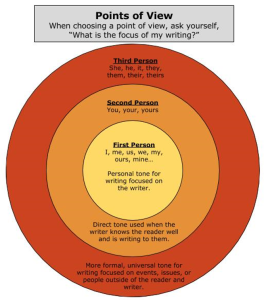13.1 Point of View
What is point of view, and how do you know which one to use? Point of view can be tricky, so this is a good question to ask yourself. Point of view is the perspective from which you’re writing, and it dictates what your focus is. Consider the following examples:
- I love watching the leaves change in the fall. (First person point of view)
- You will love watching the leaves change color. (Second person)
- The leaves in fall turn many vibrant colors. (Third person)
Which of the above sentences focuses most clearly on the leaves? Third person, right? The first person sentence focuses on what “I” love and the second person sentence focuses on what “you” will love.
- First person uses the following pronouns: I, me, my, us, we, myself, our, ours…. Any words that include the speaker/writer turn the sentence into first person.
- Second person uses any form of the word “you,” which has the effect of addressing the reader.
- Third person uses pronouns like he, she, it, they, them…. Any words that direct the reader to a person or thing that is not the writer or reader turn the sentence into third person.

That’s a lot to think about. When is it okay to use each of these points of view?
The best answer to this question is that the point of view you choose to write in will depend on your audience and purpose. If your goal is to relate to your audience in a personal way about a topic that you have experience with, then it may be appropriate to use first person point of view to share your experience and connect with your audience. At the same time, many of your college instructors will ask you to write in third person only and will want you to avoid first or second person. Why do you think that is? One important reason is that third person point of view focuses on a person or topic outside yourself or the reader, making it the most professional, academic, and objective way to write. The goal of third person point of view is to remove personal, subjective bias from your writing, at least in theory. Most of the writing you will do in college will require you to focus on ideas, people, and issues outside yourself, so third person will often be the most appropriate. This point of view also helps your readers stay focused on the topic instead of thinking about you or themselves.
The least commonly used point of view is second person, especially in academic writing, because most of the time you will not know your audience well enough to write directly to them. The exception is if you’re writing a letter or directing your writing to a very specific group whom you know well. Notice that we’re using second person in this paragraph to directly address you. We feel okay about doing this because we want you to do specific things, and we have a pretty good idea who our audience is: reading and writing students. The danger of using second person is that this point of view can implicate readers in your topic when you don’t mean to do that. If you’re talking about crime rates in your city, and you write something like, “When you break into someone’s house, this affects their property value,” you are literally saying that the reader breaks into people’s houses. Of course, that’s not what you meant. You didn’t intend to implicate the readers this way, but that’s one possible consequence of using second person. In other words, you might accidentally say that readers have done something that they haven’t or know, feel, or believe something that they don’t.
When it comes down to it, you can always ask your instructors what point of view you should use when writing an assignment for them. They may have specific reasons for wanting you to use first, second, or third person.
Continue Reading: 13.2 Tone
